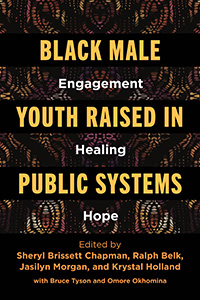
Using firsthand accounts from 200 Black adolescents, the NASW Press book, “Black Male Youth Raised in Public Systems: Engagement, Healing, Hope,” validates the fears, anxieties and complexities of this population.
The editors of the book point out that the plight of Black male children who are removed from their families and placed under the care and supervision of public agencies is driven by historical vulnerability to racist and discriminatory policies, practices and systems.
The book’s lead editor is Sheryl Brissett Chapman, EdD, LHD, EdM, MSW, ACSW, executive director of the National Center for Children and Families. She is an internationally recognized Black American expert in child and family welfare. She said the text is unique because it references firsthand accounts from Black adolescents. “This population is the most misunderstood in our public systems,” she said.
This group faces chronic and persistent stereotyping and is at heightened risk for every form of social ill, including incarceration, health and mental health disparities, poverty, violence, reduced life expectancy, and ineffective participation in the workforce and larger society, the editors point out. The public systems that these Black male youth must navigate are fundamentally not designed to help them overcome trauma, heal, and thrive as they transition to young adulthood, the editors said.
“This book is written by three women and three men, all African American, from different vantage points,” Chapman said. “We talked around the country to other folks. What we see is a pattern of ‘adultism,’ a notion that if you just follow my direction, if you would just do the program, if you would just listen to what I think is best, you can’t go wrong. It’s my way vs. hearing (the children’s) voices.”
The text stresses the need to listen to the concerns of Black youth.